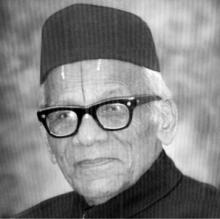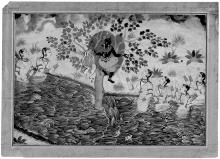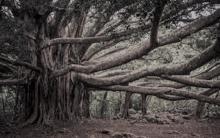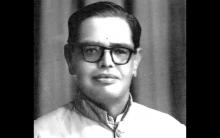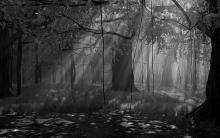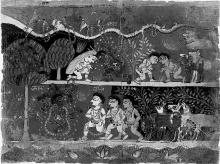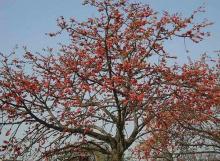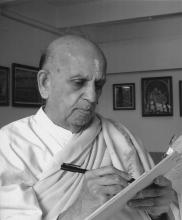Masti Venkatesha Iyengar can be called the ‘Dewan’ of modern Kannada literature. Masti, who gained appreciation having served various governmental departments with great diligence and competence, could have been the Dewan of the State in a real sense. He had the capacity and was also slated to rise to that position. But for reasons unknown, that was not to be. Seeming to compensate for that lacuna, Masti ruled as the Dewan of the world of Kannada literature and scholarship for the good part of fifty years. In the past, the well-being of the State depended on the Dewan.
Author:hari
The next day Gomukha and other friends of Naravāhanadatta came to see him. The door keeper made them wait till she obtained the permission and then allowed them inside. Ratnaprabhā ordered the door keeper thus, ‘Henceforth don’t make them wait; they are close friends of my husband; we don’t insist on such strict protocols and protection for the inner chambers.’ She then addressed her beloved, ‘O son of noble one!
Vidurāśvattha Riots
The agitation for a Responsible Government led to yet another riot, this time at Vidurāśvattha. This incident too led to firings and killings.
Appaji Gowda was Kolar’s Deputy Commissioner then.
In a play, at minimum there would be a hundred to hundred and fifty songs and verses. Their tunes would be composed on the lines of ‘Kamalākṣi nāṃ dhanyanādè,’ or the cakli song, or ‘Nāri māyākarāḻè,’ or ‘Nāḻè baruva rītikeḻi.’[1] In between these, on and off, there would be a tukaḍa jāvaḍi[2] or a tune of ‘iṅgliṣ cāl’ [Western classical tune], and so forth.
ಪರಿಮಳಪದ್ಮಗುಪ್ತ
ಪರಿಮಳಗುಪ್ತ ಅಥವಾ ಪರಿಮಳಪದ್ಮಗುಪ್ತನು ಬರೆದ ಐತಿಹಾಸಿಕಮಹಾಕಾವ್ಯ “ನವಸಾಹಸಾಂಕಚರಿತ.” ಇದು ಭೋಜದೇವನ ತಂದೆ ಸಿಂಧುಲನ ಸಾಧನೆಗಳನ್ನು ಕೊಂಡಾಡುವ ಕೃತಿ. ಇದರ ಒಂದು ಶ್ಲೋಕವು ನಮ್ಮ ಪ್ರಕೃತೋದ್ದೇಶಕ್ಕೆ ಒದಗಿಬರುವಂತಿದೆ:
ಚಕ್ಷುಸ್ತದುನ್ಮೇಷಿ ಸದಾ ಮುಖೇ ವಃ
ಸಾರಸ್ವತಂ ಶಾಶ್ವತಮಾವಿರಸ್ತು |
ಪಶ್ಯಂತಿ ಯೇನಾವಹಿತಾಃ ಕವೀಂದ್ರಾ-
ಸ್ತ್ರಿವಿಷ್ಟಪಾಭ್ಯಂತರವರ್ತಿ ವಸ್ತು || (೧.೪)
Śrī-kṛṣṇa-vijayam; Compositions for Singing
In the branch of the Vèllāḻa family that had settled in Srirangapatna, one Candraśekhara-śāstrī was famous. Either it was he or his son Rāmacandra-śāstrī who composed the Vyāyoga titled ‘Śrī-kṛṣṇa-vijayam.’ It was composed during the early part of the nineteenth century or perhaps even earlier.
केलिकेशग्रहव्यग्रगौरीकरनखावृतम्|
शिवायानेकचन्द्राढ्यमिव शार्वं शिरोऽस्तु वः||
[May that head of Śiva which looks as though it bears many moons, as the hairs are being pulled by the (moon-like) nails of Gaurī playfully, bring you fortune.]
करं दानाम्भसार्द्रं यः कुञ्चिताग्रं प्रसारयन्|
ददत्सिद्धिमिवाभाति स पायाद्वो गजाननः||
Engagement with Different Schools of Philosophy
Rao’s writings on different schools of Indian philosophy are immensely valuable and provide a lot of clarity to its readers. It is important to note that Rao has written works on the thoughts and philosophies of Śaṅkarācārya, Rāmānujācārya, and Madhvācārya. As though to aid these writings, he has penned works such as ‘Śaṅkara-vāṇī.’ He has also written a work called ‘Śāradā Pīṭhada Māṇikya’ (The Gem of the Śāradā-pīṭha) about Śrī Candraśekhara-bhāratī Mahāsvāmī, whom he considered his guru.

